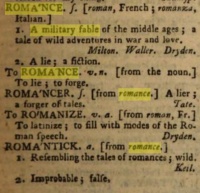Romantic
From The Art and Popular Culture Encyclopedia
| Revision as of 21:09, 12 January 2014 Jahsonic (Talk | contribs) ← Previous diff |
Current revision Jahsonic (Talk | contribs) |
||
| Line 1: | Line 1: | ||
| - | [[Image:Wanderer.jpg|thumb|200px|''[[Wanderer above the Sea of Fog]]'' ([[1818]]) by [[Caspar David Friedrich]]]] | + | [[Image:Romance as defined by Samuel Johnson in his dictionary in 1756.jpg|thumb|left|200px| |
| + | |||
| + | [[Romance]] as defined by [[Samuel Johnson]] in his ''[[A Dictionary of the English Language]]'' of 1756. The first edition being 1755, there is no reason to assume that it was different. | ||
| + | |||
| + | Romance is defined as a "[[military fable]] of the [[middle ages]]; a tale of [[wild]] [[adventures]] in [[war]] and [[love]]. [[Milton]]. [[Waller]]. [[Dryden]]." | ||
| + | |||
| + | It is also defined as "a [[lie]]; a [[fiction]]." | ||
| + | |||
| + | From the lemma ''[[romantick]]'' is omitted (because it is on the next column): | ||
| + | |||
| + | "3. Fanciful; full of wild scenery. [[Thomson]]." | ||
| + | ]] | ||
| + | {| class="toccolours" style="float: left; margin-left: 1em; margin-right: 2em; font-size: 85%; background:#c6dbf7; color:black; width:30em; max-width: 40%;" cellspacing="5" | ||
| + | | style="text-align: left;" | | ||
| + | "What is [[Classical]] is [[health]]y; what is [[Romanticism|Romantic]] is [[sick]] [[What is Classical is healthy; what is Romantic is sick|[...]]]." --Goethe | ||
| + | <hr> | ||
| + | "THE word ''[[romantic]]'' has been lately introduced in Germany to designate that kind of poetry which is derived from the songs of the [[Troubadours]]; that which owes its birth to the union of [[chivalry]] and [[Christianity]]."--''[[On Germany]]'' (1813) by Madame de Staël | ||
| + | <hr> | ||
| + | "[[Werther]] had brought exalted sentiments so much into fashion, that hardly any body dared to show that he was dry and cold of nature, even when he was condemned to such a nature in reality. From thence arose that ''forced sort of enthusiasm'' for the [[moon]], for [[forests]], for the country, and for solitude; from thence those [[nervous fit]]s, that affectation in the very voice, those looks which wished to be seen; in a word, all that apparatus of [''[[romantic]]''] [[sensibility]], which [[vigorous]] and sincere minds disdain."--''[[On Germany]]'' (1813) by Madame de Staël | ||
| + | |} | ||
| + | [[Image:Wanderer.jpg|thumb|200px|''[[Wanderer above the Sea of Fog]]'' (1818) by Caspar David Friedrich]] | ||
| {{Template}} | {{Template}} | ||
| - | # Concerned with, or conducive to, [[Romance (love)|romance]] and [[love]]. | + | '''Romantic''' means concerned with, or conducive to, [[Romance (love)|romance]] and [[love]]; [[ideal|Idealistic]] yet [[impractical]] or [[passionate]] and [[imagine|imaginative]] rather than [[structure]]d. |
| - | #: ''Their kiss started casually, but it slowly turned '''romantic'''.'' | + | |
| - | # [[ideal|Idealistic]] yet [[impractical]]. | + | |
| - | #: ''Mary sighed, knowing her ideals were far too '''romantic''' to work in reality.'' | + | |
| - | # [[passionate|Passionate]] and [[imagine|imaginative]] rather than [[structure]]d. | + | |
| ==Etymology== | ==Etymology== | ||
| From ''[[romaunt]]'' + ''-ic''. As in the ''[[The Romaunt of the Rose]]''. | From ''[[romaunt]]'' + ''-ic''. As in the ''[[The Romaunt of the Rose]]''. | ||
| Line 12: | Line 28: | ||
| *[[Romanticism]] | *[[Romanticism]] | ||
| *[[Romance]] | *[[Romance]] | ||
| + | *[[Romantic love]] | ||
| {{GFDL}} | {{GFDL}} | ||
Current revision

|
"What is Classical is healthy; what is Romantic is sick [...]." --Goethe "THE word romantic has been lately introduced in Germany to designate that kind of poetry which is derived from the songs of the Troubadours; that which owes its birth to the union of chivalry and Christianity."--On Germany (1813) by Madame de Staël "Werther had brought exalted sentiments so much into fashion, that hardly any body dared to show that he was dry and cold of nature, even when he was condemned to such a nature in reality. From thence arose that forced sort of enthusiasm for the moon, for forests, for the country, and for solitude; from thence those nervous fits, that affectation in the very voice, those looks which wished to be seen; in a word, all that apparatus of [romantic] sensibility, which vigorous and sincere minds disdain."--On Germany (1813) by Madame de Staël |

|
Related e |
|
Featured: |
Romantic means concerned with, or conducive to, romance and love; Idealistic yet impractical or passionate and imaginative rather than structured.
Etymology
From romaunt + -ic. As in the The Romaunt of the Rose.
See also

